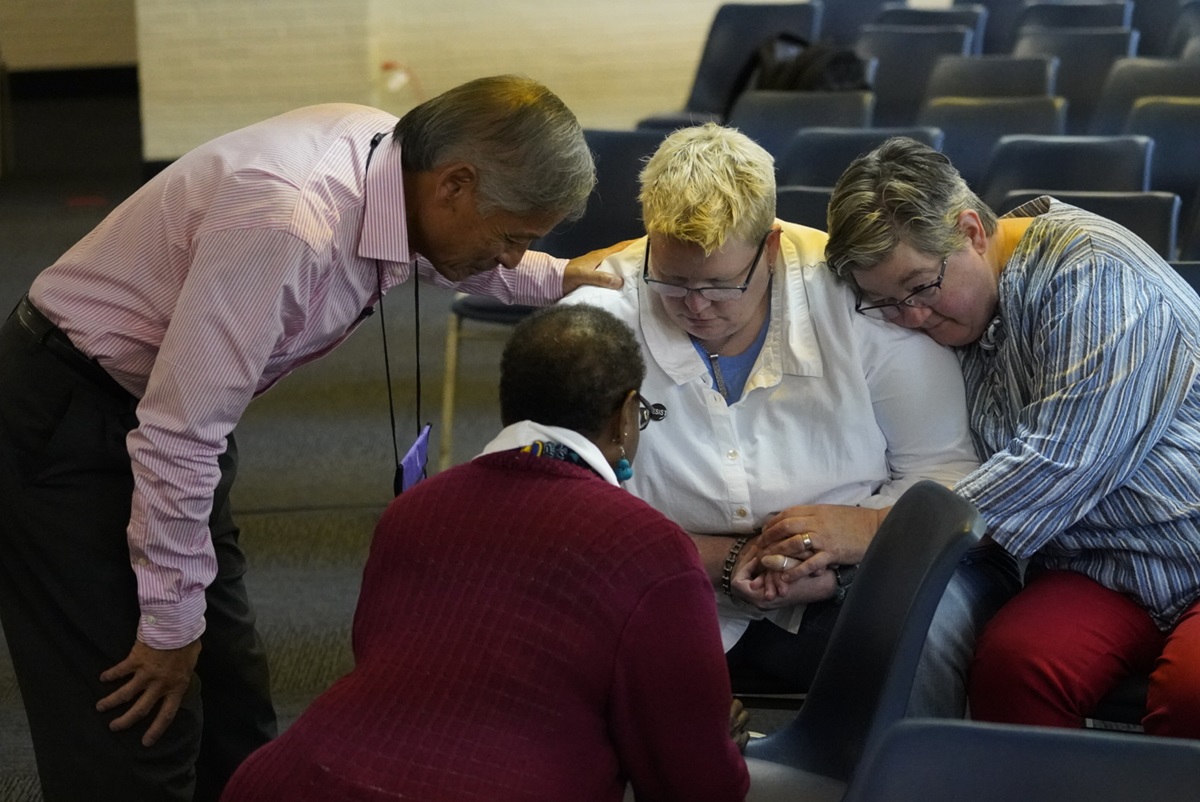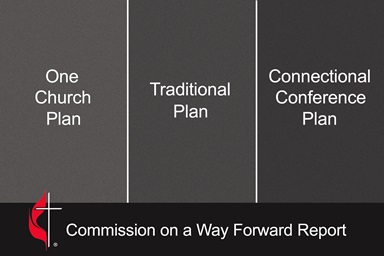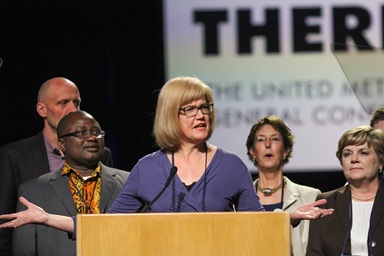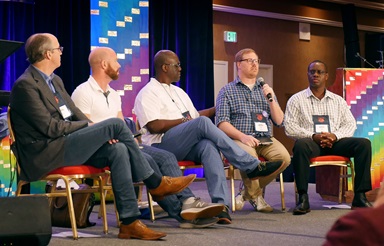As United Methodists debate how the denomination regards homosexuality, many LGBTQ church members have felt they are not so much at the table as the main course to be served.
After hearing their concerns, the denomination’s Council of Bishops took the unprecedented step of addressing a pastoral letter to the global LGBTQ community that laments the harm done.
However, a number of lesbian, gay, bisexual, transgender and queer United Methodists say the letter falls short. Yet other LGBTQ members find it offers needed recognition.
“As leaders of the church, we are brokenhearted by conversations that dishonor, objectify and dehumanize,” said the bishops’ letter. “We confess, as Bishops of The United Methodist Church and as we attempt to honor our convictions, that our actions and words have not always been life-giving or honoring of the LGBTQ community. Amid our sorrow, we seek to learn and grow in grace.”
The Rev. Pamela R. Lightsey, an openly queer United Methodist elder and academic, responded to the letter in a Facebook post whose message was echoed by a number of fellow LGBTQ church members. She commended the bishops for taking the step of writing the letter but expressed disappointment in its contents.
“I don’t look for the council as a whole to say what it cannot. Many of the very persons complicit in our oppression sit on the council,” Lightsey told United Methodist News Service. “I do, nonetheless, hope that active members of the episcopacy who have been quiet in their support of the rights of LGBTQ UMC members will now step forward and boldly say the denomination must end its discriminatory practices.”
The Council of Bishops approved a motion at its Nov. 4-7 meeting to write the pastoral letter. Its writing team included a bishop from each of the denomination’s five jurisdictions in the United States and seven central conferences in Africa, Europe and the Philippines.
Bishops released the letter in English late Friday afternoon, Dec. 28. They plan to translate it into other languages, said the Rev. Maidstone Mulenga, the Council of Bishops’ director of communications.
Dennis Akpona, a United Methodist from Nigeria — where coming out can have deadly consequences — finds hope in the letter. As a gay man who loves God, he said, he sees the church as a refuge.
“Though the letter was not perfect, I believe this is the first step to redemption and there is still a lot to be done by the bishops, especially in the African central conferences,” said Akpona. He now has asylum in the United States but continues outreach with African United Methodists on behalf of the unofficial advocacy group Reconciling Ministries Network.
“I look forward to a time where LGBTQ+ family in Africa will feel comfortable approaching their clergy and bishops to discuss issues affecting them without any fear of discrimination from the church.”
The bishops’ letter comes as United Methodists around the globe prepare for a special General Conference on Feb. 23-26 in St. Louis. The special session of the multinational lawmaking assembly aims, after decades of debate, to set the direction on how the denomination ministers with LGBTQ individuals.
The letter follows the urging of the unofficial LGBTQ advocacy group Love Prevails. The group, which previously has disrupted church meetings, instead presented a letter at the bishops’ fall meeting.
“As the special General Conference approaches, our lives and worth come under ever more vicious and sustained scrutiny,” the Love Prevails letter said. “No matter which plan is passed or if no plan is passed in February 2019, the lives and the loves of queer people will be fought over without us having much voice or vote in that process.”
The Rev. Will Green, speaking on behalf of Love Prevails, said the letter confirms the bishops know they are doing harm but lacks any awareness of accountability.
“We hope the bishops learn that when they are hurting people, they should stop,” he said. “Instead of modeling mature Christian reflection, the letter was somehow made even worse by bishops who think they have done a good thing.”
The Rev. Israel “Izzy” Alvaran also said the letter lacked words of repentance, but he is hopeful repentance will come. Alvaran is a gay United Methodist elder from the Philippines who has political asylum in the United States and works with Reconciling Ministries Network.
“It is not perfect as I would hope for; however, I believe in the power of grace,” he said, speaking for himself and not his organization. “Even in its most simple expression or with unintended motivation, acts of grace allow the Spirit to touch people’s hearts.”
Currently, the denomination teaches that while all people are of sacred worth, the practice of homosexuality is “incompatible with Christian teaching.” Church laws officially ban the ordination of “self-avowed practicing” gay clergy and the blessing of same-gender unions. Bishops, often the first stop for formal complaints against clergy, are usually the enforcers of these restrictions.
Some bishops, other clergy and whole conferences publicly defy these policies, while other pastors and churches are threatening to leave unless the policies are carried out.
“The most immediate harm we all feel right now is that the bulk of the church has continued to treat LGBTQ people as an issue of debate and theological discussion and not as people, let alone people of sacred worth,” said Dorothee Benz, a delegate from the New York Conference.
Her New York delegation is nearly half LGBTQ. However, only a small percentage of the total 864 lay and clergy delegates who will vote at the special General Conference identify as any of the initials in LGBTQ.
Randall Miller, one of those delegates, also expressed gratitude for and concerns about the bishops’ letter. He said the document fails to acknowledge that some bishops helped draft the proposed Traditional Plan that aims to increase enforcement of church restrictions and encourage those who disagree to leave. The plan, he said, would exponentially increase suffering.
“Every day, I hear of unnecessary trials, discrimination and even violence done in the name of the church,” Miller said. “This is the harm that I wish the council would address. Very little else matters if the council cannot speak to this reality.”
For United Methodists who are clergy candidates, this is a particularly stressful time. That’s no less true for LGBTQ clergy candidates.
“It’s been utterly bizarre to prepare and work for my ordination in June 2019, when I have not known what exact iteration of the denomination I am being ordained into, and if I will be welcome by then in it,” said the Rev. Lea Matthews, a provisional deacon in the New York Conference. She is also on the executive committee of the unofficial Queer Clergy Caucus.
The denomination’s sole openly gay bishop, Bishop Karen Oliveto of the Mountain Sky Conference, anticipated the mixed response to the bishops’ letter.
“For some LGBTQ people and families, it is a long-hoped for recognition. For others, it is not enough until the lives of LGBTQ are seen as precious in the eyes of the church as they are in the eyes of God,” she said. “For still others, it is too little, too late — we have lost so many gifted and called people of all ages to other, more welcoming, mainline Protestant denominations.”
Her hope is that United Methodists will stop talking about fellow church members who are LGBTQ, and start talking with them.
“Find out about how The United Methodist Church caused us to fall in love with God and helped us grow in our discipleship as followers of Jesus,” she said. “Learn about how coming out has been an incredibly spiritual experience that has connected us even more deeply with the God who created us. Let us tell you about our families and the ways love has helped us be more whole. Look into our eyes, and see if you can recognize the image of God.”
Hahn is a multimedia news reporter for United Methodist News Service. Contact her at (615) 742-5470 or newsdesk@umcom.org. To read more United Methodist news, subscribe to the free Daily or Weekly Digests.
Like what you're reading? Support the ministry of UM News! Your support ensures the latest denominational news, dynamic stories and informative articles will continue to connect our global community. Make a tax-deductible donation at ResourceUMC.org/GiveUMCom.




